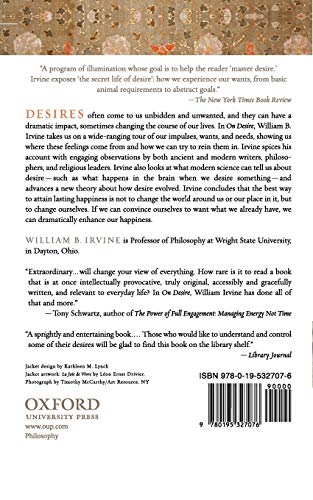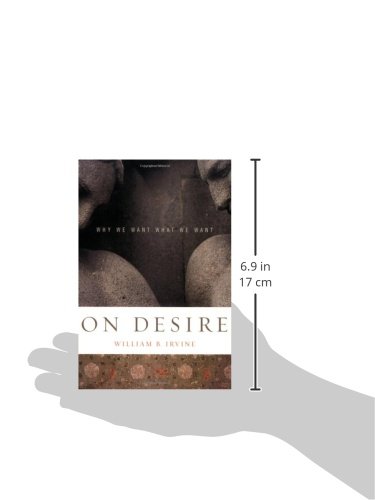



Full description not available
T**W
Change Your Desires Change Your Eternity
The Buddhists say to end suffering we need to end desire. But is that really a fun way to live? Don't some good desires also bring us enjoyment and even make life worth living? This book doesn't say you should or should not have desires. The author makes no moral judgments and doesn't give lists of good or evil desires. Instead he helps you understand human nature and points the way to a happier existence through the ideas of how to harness desires.This book delves into religion, philosophy and science. This makes the book captivating and presents a multicultural look at desire. What was made clear to me is how a desire or a disappearance of desire can change your life. As the author states: “We are awash in desire at virtually every waking moment.”I felt this was a very thoughtful look at a subject which when delved into this deeply presents the reader with many options. You may learn something about how to keep desires in check. The author does however point out that even Buddha did not extinguish all his desires. He still wanted to breathe, eat and help others become enlightened.The only thing I disagreed with in the book was the idea about evolution being part of desire. If you don't believe in evolution you can easily overlook the one chapter and a few other comments about evolution.Since your desires can either make life a heaven or hell it is useful to gain a great sense of perspective on your life. This book is enlightening in that way. This book also helped me see that anxiety is all about your desires for the future. Most people also apparently desire immortality and fame.What this book doesn't talk about and has helped a few people greatly is to get an eternal perspective. Reading books on heaven and hell can help a person make better decisions and control their desires more. Your desire for heaven can become greater than all your other worldly desires. Your fear of hell can make you have good desires instead of evil ones. At some point you may also get to the stage where you want God's will to be done, more than you want your desires to be satisfied. At this point you may become the happiest person you know.I'd put this in the top 100 of the best books I've ever read! Mostly because it could change your life for the better.~The Rebecca Review
D**Y
Many Words, An "I" on Every Page, Grossly Oversimplified, but Still Worth the Price
Having read Irvine's A Guide to the Good Life, I was expecting much more than this book offered. It's interesting and contains a lot of interesting factoids about research but, for a book focused on desire, it left me very unsatisfied. The topic of desire is a fascinating one, but Irvine defines it much too broadly: in addition to what we normally think of as desires (i.e., passions turned into an object of will (my definition)), he lumps in basically any nerve impulse that one might have, leading to a circular reference of absurdity. In his definition, if you are conscious of an act of volition, then it's a desire. If you want to fart, it's a desire. If you want to paint the Mona Lisa, it's a desire. Then, he offers a huge number of completely unsupported assertions dressed up as quasi-scientific facts. When you parse these, they are a dog's breakfast of borrowed findings, wild stretches or completely unscientific mumble-jumble. For instance, he posits that natural selection favored desire such that organisms with desire (e.g., willingness to eat, breed, defend themselves) survived, whereas those without desire did not. This, he says, is the third greatest development in the evolution of life. First, this is just storyteller science with no actual basis in any research. Second and worse, it's just so obvious as to be ridiculous: "natural selection favors organisms that act to exist" is his argument in a nutshell. Well, duh. Following this, we have an incredibly long anthropomorphism about hens. Then we get into a whirlwind tour of Buddhism ("meditation removes desires" is an example of his oversimplication), followed by a few pages on Christianity, followed by strangely lengthy tours of the beliefs of the Amish, Hutterites, the Shakers and the Oneida Community, and finally an extremely brief recapitulation of his actual area of expertise, Stoicism. Then, after telling us early on that he inclines towards the ancient view of philosophy's purpose, namely how to live well, rather than modern philosophy's exegistic approach, he concedes in the final section of the book that he's clueless about the relative merits of the various paths towards "tranquility" which he posits as the supreme good. For an expert on the Stoics, this is a weird translation (as others have remarked) of Eudaimonia (loosely, happiness or complete satisfaction), which was seen as the ultimate goal for most of the ancient philosophers. Continuing his distortion, he even contrasts the lack of interest of teenagers in "tranquility" compared to their elders, when in fact, (almost) all human beings desire Eudaimonia, with tranquility being a means for some only to that end. Pretty hard to see, for instance, how Socrates or Cato the Younger were pursuing tranquility as their ultimate good, whereas Eudaimonia was clearly their object.In a more peevish vein, was it really necessary for Irvine to insert himself into almost every page through the use of the first person (and to make the occasional comparison like "Locke felt this but I feel this" (paraphrased)? In the end, Irvine has written a "cotton candy" exposition of the topic -- no one will read this book five years from now -- but it tastes good while you read it and then you feel a cloying taste towards the end.
D**R
Desire: a deep dive
Exceedingly thought-provoking tome on desire by Prof. Irvine. He offers a wealth of ideas about how to monitor and partially control one's desires insofar that we driven by desire.If you are interested in learning more about how desire drives our lives, then this volume is highly recommended. If you are simply interested in learning how different cultures, religions, etc. monitor their desires, then check this out. Overall, this volume can help you on a path to becoming a better human.
A**R
A comprehensive tour of the religious and philosophical views on desire
I came across this book by complete accident - i.e. by Googling my own name, 'William F Irvine', just to see what came up. Discovering that my namesake is a Philosophy Professor (I have a degree in the same subject and am particularly interested in the area of desire) I couldn't NOT buy a copy. I enjoyed William B Irvine's comprehensive tour of the religious and philosophical views on the subject, particularly the Stoics'. I also enjoyed his explanations on desire's biological/psychological origins. However, I was disappointed that the book didn't explore or offer much in terms of approaches either for harnessing or reining in desire or its corollary, anxiety- key questions that interest me.William F Irvine - Author of The Polygamist, a novel exploring love, sex, marriage and the nature of desire The PolygamistThe Polygamist
G**A
The Good Life Explained
Really enjoyed this book and learned a great deal from it. It is probably the best and most readable book around covering the philosophy of stoicism. Anyone interested in the ‘good life’ should give this book a go; beautifully written, eloquently argued and, though geared mainly to the pros of stoicism, the author does address the criticisms often aimed at stoicism. Definitely a good read and highly recommended.I hope you find my review helpful.
T**R
So so
Some interesting explanations here on the biological/psychological origins of desire. Overall though this is really quite a derivative work presenting other people peoples views rather than adding anything. As such it has been researched as a student might research for an essay...consequently the understanding shown in some areas is shallow.More could have been made of the nature of consciousness and desire perhaps. Conversely, the rather obvious fact that our desires are determined by evolution is expounded at excessive length.Irvine seems to be a teacher of American undergraduates and this book is at that level..so if you want an intro in this area this will probably be a good read. If you are looking for something meatier and already know something of evolution, psychology, the major religions and classical philosophy then you will soon be skimming through.
A**T
GREAT!
Great book by a great author supplied by a wonderful company.
A**R
Five Stars
I recommend!
Trustpilot
1 month ago
2 months ago